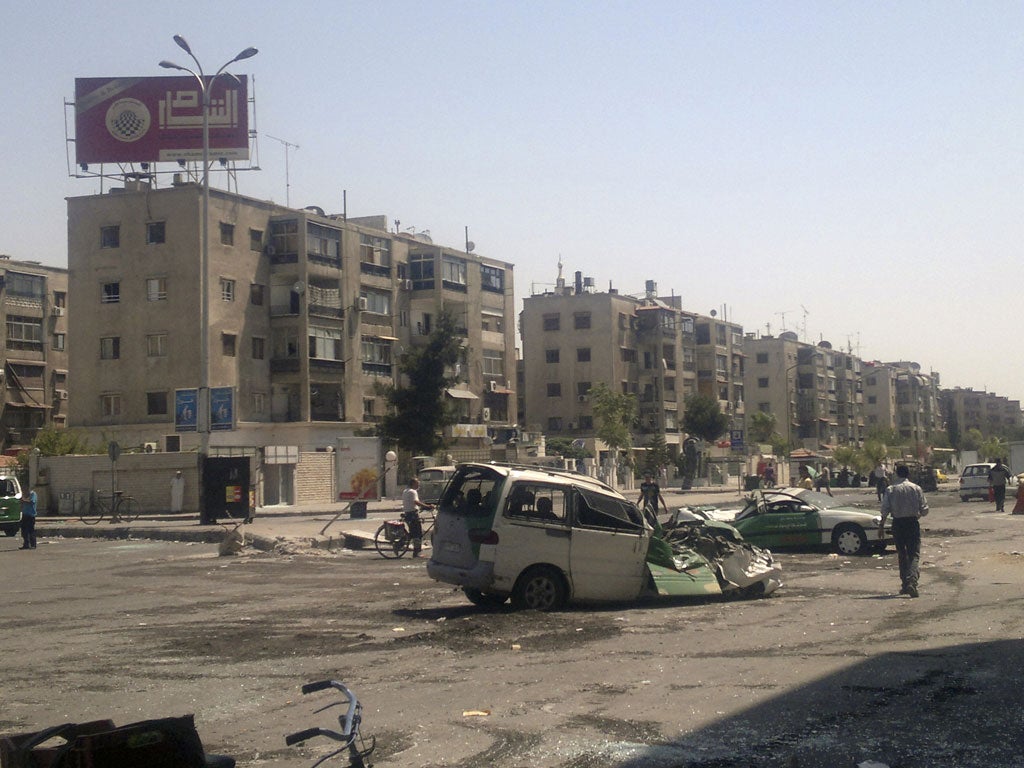Assad loses grip on Syria's second city as sheikhs back insurgents
Fierce street battles in Aleppo are fought by rebels emboldened by the bomb that killed four of the president's regime. But rumours of chemical weapons on the move fuel fears of a bloody finale

Your support helps us to tell the story
From reproductive rights to climate change to Big Tech, The Independent is on the ground when the story is developing. Whether it's investigating the financials of Elon Musk's pro-Trump PAC or producing our latest documentary, 'The A Word', which shines a light on the American women fighting for reproductive rights, we know how important it is to parse out the facts from the messaging.
At such a critical moment in US history, we need reporters on the ground. Your donation allows us to keep sending journalists to speak to both sides of the story.
The Independent is trusted by Americans across the entire political spectrum. And unlike many other quality news outlets, we choose not to lock Americans out of our reporting and analysis with paywalls. We believe quality journalism should be available to everyone, paid for by those who can afford it.
Your support makes all the difference.President Bashar al-Assad's grip on another of his traditional bastions of support slipped yesterday, as fierce street battles erupted in Syria's second city, Aleppo. As government forces struggled to subdue rebel assaults on the streets of the capital, Damascus, the intense fighting in Aleppo multiplied the threat to the Assad regime.
The Syrian Observatory for Human Rights reported heavy clashes between security forces and rebels in the second city, after local sheikhs backed the insurgents attempting to overthrow the president. Dozens of fighters have since streamed into the city from the countryside, sparking the first sustained fighting in the city's centre since the uprising began in March 2011.
Aleppo-based activist Mohammed Saeed said the fighting continued throughout the night until yesterday morning, most of it in the central Salah al-Din district.
"Last night was very bad," he told the Associated Press. "There were huge explosions and the gunfire didn't stop for several hours.
"The uprising has finally reached Aleppo."
The challenge to one of President Assad's most loyal cities added to the sense of escalating crisis in Syria, amid swirling rumours that regime forces were moving stockpiles of chemical weapons to use in retaliation for the audacious attack on his inner circle last week.
United Nations Secretary-General Ban Ki-moon announced that he was sending his peacekeeping chief, Hervé Ladsous, to Syria, and had asked his top military adviser to take charge of the observer mission. The move came after the UN Security Council voted to extend the mission of 300 unarmed observers for a "final" 30 days.
A resolution stated that the monitors would then leave if they were unable to carry out their job of verifying the peace plan brokered by the UN and Arab League's special envoy, Kofi Annan.
The observers' work has been mostly suspended since June because of the escalating violence, which reportedly left more than 300 people dead on Thursday and another 200 on Friday. The levels of violence showed no sign of decreasing, with an emboldened Free Syrian Army (FSA) increasing the ferocity of its attacks on a regime that is struggling to maintain a united front in the face of crisis.
Officials in Ankara yesterday said two Syrian brigadier-generals fled over the border into Turkey overnight, part of a group of about 10 people that included colonels and other military officers. The latest defections would bring the number of Syrian generals taking refuge in Turkey to 24.
Aleppo, a mixed city near the Turkish border, is home to a large merchant-class population that has reaped the rewards of loyalty to the regime. The city has largely remained loyal throughout the 16-month uprising, but, for months, rebels have been gaining strength in poorer towns and cities in the surrounding countryside, winning footholds near the Turkish border.
Local sheikhs last week announced their support for the rebels following the bomb attack that killed four of the president's closest aides.
Residents streamed out of Salah al-Din as armed FSA gunmen battled with regime troops who had been shelling the area.
The Local Co-ordination Committees, an activist network, said there had been an "exodus" of Salah al-Din residents "because of fear of a regime bombardment and offensive".
Fahad al-Masri, an FSA spokesperson, said: "Thousands of families have left because there is too much shelling from tanks. The Free Syrian Army is trying to liberate the area but the situation is very, very difficult."
Opponents claim that the bomb attack which killed four members of the Syrian regime, including the Defence Minister and President Assad's brother-in-law, had shattered the image of invulnerability that had guaranteed the president the loyalty of many long-term supporters.
In the capital, Damascus, government forces still had not achieved their stated goal of clearing up all resistance within five days. Fighting had died down after heavy clashes overnight, but sporadic shelling and gunfire could be heard.
FSA rebels maintained control of the Bab al-Hawa border post with Turkey for the second day, despite the regular army being only six kilometres away. There was also a violent and prolonged battle in the rebel-held town of Talbasiya, in central Syria.
A senior military defector yesterday warned that the regime forces were moving stockpiles of chemical weapons to use in retaliation for the attack on President Assad's camp.
"They are moving it from warehouses to new locations," said General Mustafa Sheikh, citing FSA intelligence. "They want to burn the country. The regime cannot fall without perpetrating a sea of blood."
Western diplomats say they are aware that the stockpiles of sarin, mustard gas and cyanide are being moved, but some believe the regime is trying to safeguard them from falling into the hands of the opposition.
Join our commenting forum
Join thought-provoking conversations, follow other Independent readers and see their replies
Comments